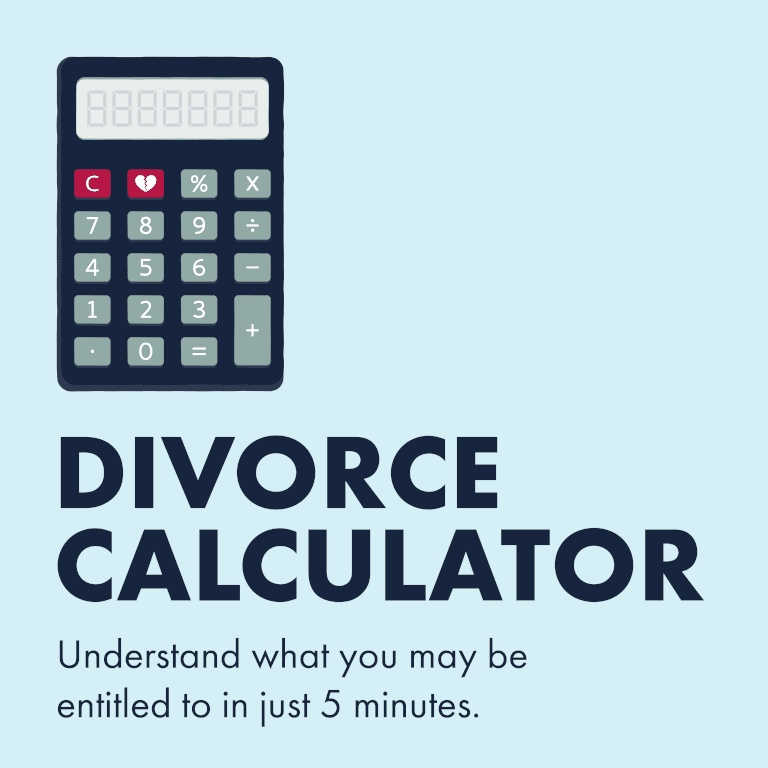 Use the calculator
Use the calculator
Splitting property in a divorce: How does it work?
read moreIf you decide to get a divorce or dissolve your civil partnership, you’ll have several options to consider when it comes to the family home:
- Many couples may find the simplest solution is to sell the property and divide the money from the sale to start afresh.
- If possible, one of the parties can take full ownership of the property in the divorce. This would involve one party purchasing the other’s share of the home.
- If children are involved, you may find the best solution is to maintain joint ownership of the family home, with one party residing in it until the children reach a certain age.
- You could agree to transfer a portion of the property’s value as a financial settlement. By doing this, the partner giving up some ownership maintains an ‘interest’ in the home, meaning they’ll receive a percentage of the final sale price.
We offer an award-winning service
 Download our free financial disclosure guide
Download our free financial disclosure guide
What does the court consider when it comes to family property and divorce?
read moreWho gets the house in a divorce with children involved is something that the courts will carefully consider, with several important factors influencing their decision:
- The welfare of a child of the family.
- The income, earning capacity, property and resources of each person.
- The financial needs, obligations and responsibilities of each person.
- The standard of living enjoyed by the family before the breakdown of the marriage.
- The age of each person and the duration of the marriage.
- Any physical or mental disability.
- The contribution made by each person to the welfare of the family, including looking after the home and bringing up children.
- The conduct of each person, but only if it is so bad it would be unfair to ignore it. This applies only in very exceptional cases.
- The court may also decide whether a clean break is appropriate.
Navigating the division of the family home during a divorce is rarely straightforward and emotions can cloud even the most practical decisions. A specialist divorce lawyer brings not only legal expertise but also strategic guidance, ensuring you understand your rights and secure a fair outcome. With the right legal guidance, you can move forward with confidence, knowing your future financial security is protected.
 Download our free Form E guide
Download our free Form E guide
What would a court decide if we can’t agree on the divorce property division?
If it is not possible to agree on arrangements regarding your finances, the property and any children, it will be necessary to go to court.
read moreEach case is different but there are common issues when it comes to divorce and property which would be examined by the court. As previously addressed, a court could order the sale of a property and apportion the proceeds between both parties in any way it chooses.
It could split the ownership differently so that one party retains an interest in the property until a later date, or it could order a lump sum to be paid, endowment or life policy to be split or reassigned and the pension pot could also be allocated differently.
It can also consider any inheritance if it seems that two properties cannot be bought with the declared financial assets.
How to avoid selling your house in a divorce
Many people may want to avoid the upheaval of leaving their marital home before or during a divorce settlement, especially when there are children involved. If you feel that this would be the best solution for you and your family, there are steps you can take to ensure you can remain at the property.
- Negotiate a buyout: If you want to keep the family home, you could buy out your spouse’s share using cash or assets or by refinancing or taking over the existing mortgage in your name.
- Co-ownership agreement: If you do not want to sell the house immediately, one spouse could continue living in the family home with an agreement to sell later. Alternatively, you could both move out and rent out the property if you want to retain ownership in the short term.
- Offset with assets: If you have substantial marital assets, you may be able to negotiate to keep the house in exchange for funds from savings or investments.
- Consider a delayed sale: In some cases, the court may allow one spouse to stay in the family home if moving out immediately is not practical, especially if there are children involved. A delayed sale or ‘nesting’ period can be established if both parties are in agreement.
Arrangements must be put in place to continue any payments regarding the property or properties during your divorce. If you are unable to keep up with the repayments, you should consult with your mortgage provider immediately.
Common questions on divorce property division
Common questions on divorce property division
-
Who gets the house in a divorce if we haven't been married long and we don't have any children?
If there aren’t any children, the marriage has been short and both parties can support themselves having equally invested in the property, the home would probably be sold and assets divided equally.
The only exception to the above is for marriage later in life where one spouse may lose a home after giving up all rights from a previous divorce settlement.
The court would consider the above deciding factors when splitting property in a divorce.
-
What if there is enough in the pot to buy two properties in a divorce?
This, of course, would be ideal. The primary concern of the court would be to provide a suitable home for the parent with the main care of any children, while also providing a home where they could visit the other parent.
-
What happens if there is not enough money to buy two properties after a divorce?
The court could consider selling the property and dividing the proceeds according to the needs of each spouse so that two smaller properties could be bought.
If this is not financially feasible, then the first consideration of the court would be any dependent children. A home must be provided for the children irrespective of the other parent’s plans and aspirations.
The court has wide powers in apportioning assets. It could rule that one parent maintains a financial interest in the property, say until the children become independent. When the house is sold, the proceeds – after paying off any mortgage – could be divided as previously ruled by the court. This is known as a Mesher order. It could also arrange for a lump sum to be made to one party in lieu of interest in the property.
-
The property is only in one name. Do I have any rights in the divorce?
If the property is in your ex-partner’s name, or you are renting the property , steps may be taken to protect your interest when splitting property in a divorce by registering this with the Land Registry. This could ensure that the property cannot be sold, or further charges be placed on the property without your knowledge, pending negotiations or legal proceedings.
-
What is a Home Rights Notice and how does it work?
In England and Wales, a Home Rights Notice is a protective measure for individuals who don’t own a property but have rights to live in it. They are usually used when people continue to live in their partner’s property during divorce or civil partnership dissolution.
By submitting a Home Rights Notice to the Land Registry, the non-owning partner can protect their right to live in the matrimonial or civil partnership home and prevent the sale of the property until matters are resolved and the notice is lifted.
A Home Rights Notice is a safeguard measure to ensure that the interests of non-owning partners are acknowledged and respected during any potential sale of the property. It doesn’t change the legal ownership of the property. Instead, it provides the non-owner with two vital elements of protection:
- The right to occupy the house; and
- Protection from the owner-spouse selling or transferring the house or raising a new mortgage against the home.
-
My spouse has moved in with a new partner. Does this affect who gets the house in the divorce?
When submitting the details of your finances, this should also be declared. A new partner’s property cannot be placed in the pot but a court could consider that there would, therefore, be more money available to provide for the other spouse’s accommodation, particularly when children are concerned.
Likewise, if a new partner has moved into the ex-matrimonial home, then the court would assume that the new partner is contributing to the running expenses of the household. If either of you has plans to remarry, this should also be declared.
-
Should I leave the marital home before the divorce?
Sometimes staying in the family home can be rather burdensome and expensive. It may be an ongoing financial struggle to keep up with payments – mortgage, insurance, council tax and utilities. If you have children, maintaining the family home could result in less money to go around for them and, as we all know, children’s costs increase, not decrease, as they grow older.

Consult with Stowe’s family finance solicitors
Our expert team of divorce, family, finance and cohabitation lawyers can offer you guidance and support as you navigate your separation and ensure that you get the financial assets that you’re entitled to. We’ll advise you on the most effective and efficient process, taking your personal circumstances into account.
Latest advice
Newsletter Sign Up
Sign up for advice on divorce and relationships from our lawyers, divorce coaches and relationship experts.
Privacy Policy



















